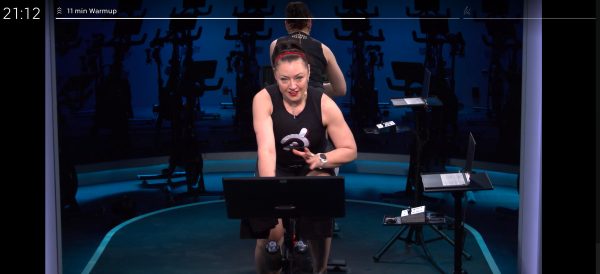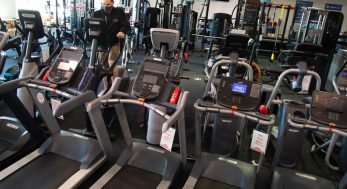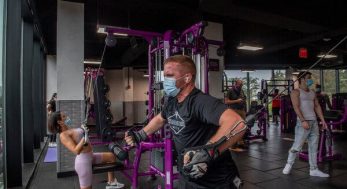As gyms across the United States close due to the novel coronavirus pandemic, streaming fitness companies like Tonal, FightCamp, and Mirror have temporarily halted filming new content due to executive orders by California and New York to shut down nonessential businesses. Peloton, however, is continuing to push on with production, hosting up to four live sessions daily filmed in an empty studio.
The decision has caused a divide between Peloton users. While some are thankful to be able to cycle with their favorite instructors and other peers who are also stuck at home, other members are urging the company to stop filming to prioritize the health of the Peloton production crew.
“I love the rides, but cannot fathom how they consider spin classes to be ‘essential’ especially with the vast on demand library we all have access to,” Robyn O. commented on Peloton’s official Facebook group. “They should be at home too. Safety first,” another user added, with many more hoping Peloton can figure out a way for instructors to host classes from home.
Though Peloton offers thousands of on-demand videos in its library, many users prefer live classes as they feel their workouts are more effective when they can race against other riders on a live leaderboard. In recent weeks, the live classes have also become riders’ daily reprieve from the stresses of the current news cycle. Last week, more than 12,000 people streamed into Peloton VP of fitness programming Robin Arzon’s class, which was held without the usual live audience. The instructor shouted out words of encouragement while refraining from directly referencing the coronavirus, played music with family-friendly lyrics, and nodded to frontline workers like nurses and doctors.
“Robin, we all needed you today and you showed up. I smiled a lot, but got my good cry during Rise Up,” Stephanie K. shared in Peloton’s official Facebook group. “I felt the togetherness of the Peloton community this morning, so thank you.”
Before the coronavirus shutdown, Peloton’s in-studio classes were in high demand, with most classes fully booked and some sold out weeks in advance. Live riders are now hoping Peloton can continue to safely offer the classes to support their mental and physical health during the pandemic.
“Public transportation is running … This is one instructor in a room with a skeleton crew. There’s a balance between being cautious and unnecessary panic,” Jennifer M. said. “Many people look forward to their live rides. Emotional health is also important.”
Peloton may not be able to continue for long, though. Peloton films most of its classes in New York, which has the highest number of confirmed coronavirus cases in the US, with more than half of the cases concentrated in the densely populated New York City area. Last Friday, New York Gov. Andrew Cuomo ordered all nonessential workers to stay home, but Peloton has continued to operate with a minimal set. The state defines “news media” as an essential business, and it’s not clear that the exemption applies to entertainment content like Peloton’s.
“While we continue to teach a reduced number of live classes from Peloton Studios New York for the time being, like other media companies who are still on air, we are working with a limited team of only essential employees and are operating as a ‘closed set,’” a Peloton spokesperson told The Verge last week after the order was announced. It also broadcasts classes from its London studio, and all locations are limited to a maximum of two instructors on set per day. The company did note that its policies are being evaluated constantly as the situation evolves.

Elsewhere, connected fitness companies like San Francisco-based Tonal and New York-based SoulCycle, which recently released an at-home bike, say that although they’ve stopped filming, they still have new, prerecorded content to release to users over the coming months.
“We do have a number of programs that were previously taped and are in post-production,” a Tonal representative tells The Verge. Tonal, which makes a connected weight training machine, typically adds four to six new pieces of content every month, some of which are month-long programs that consist of multiple classes. The company anticipates that its current roster of classes should provide several months’ worth of new content if the shutdown continues. In the meantime, it has made its yoga workout videos available on YouTube to widen access.
Similarly, FightCamp, which makes a connected punching bag for at-home boxing classes, says it has “a large queue of workouts” still to come. New York-based Mirror did not specify how much content it has in its backlog, but it has temporarily suspended one-on-one personal training and live classes.
Connected fitness companies charge anywhere from $39 to $49 a month for access to their content library on top of the equipment hardware. None of the companies have mentioned plans for a prorate given the reduced capacity to film new content. For now, it seems that most users are just happy to have something to work out to as they adjust to settling at home for the duration of the quarantine period.

